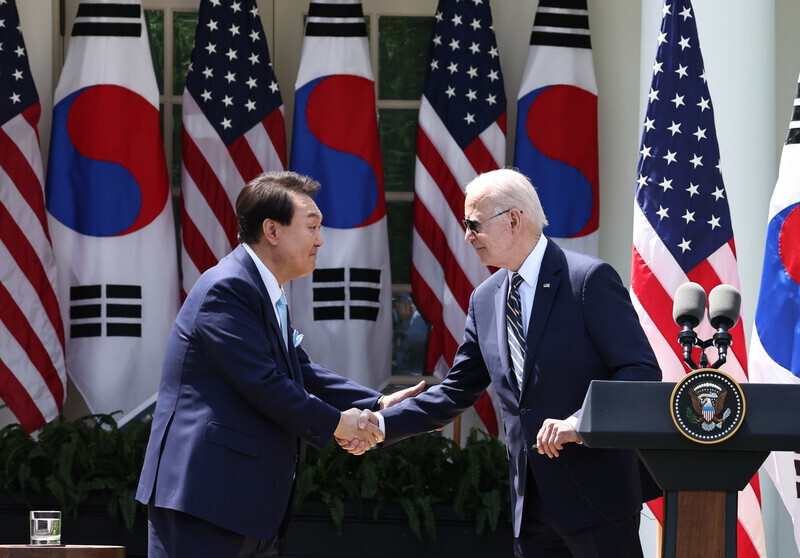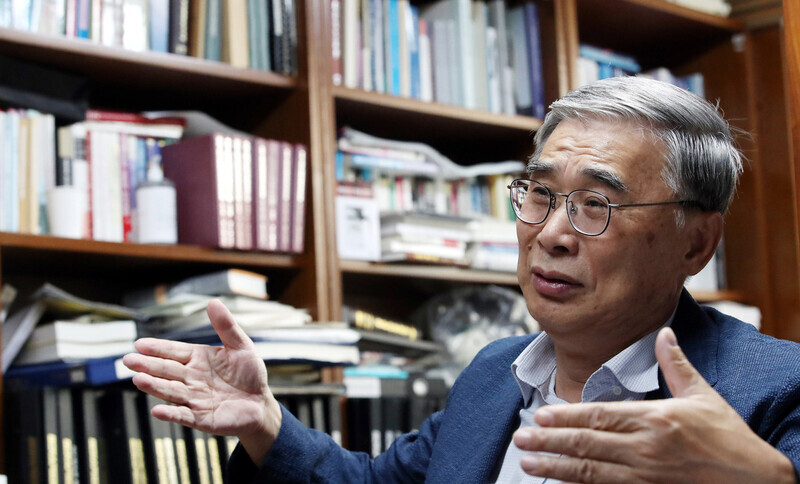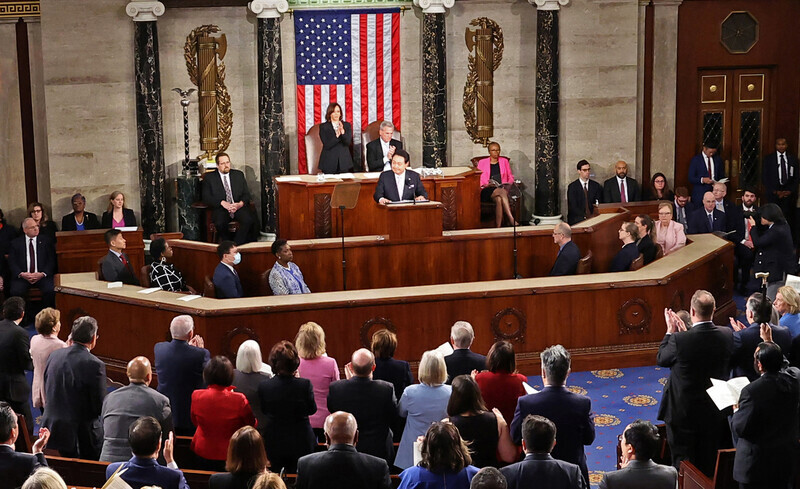hankyoreh
Links to other country sites 다른 나라 사이트 링크
[Guest essay] After all the song and dance, Yoon’s values diplomacy puts Korea last

By Lee Jong-seok, former minister of unification
South Korean President Yoon Suk-yeol seems to be a different type of leader from his predecessors. For around six decades since the Park Chung-hee regime, South Korean presidents have strived in their foreign policy to keep the Korean Peninsula’s political situation on a stable footing, regardless of their own disposition or conservative/progressive identity.
For the past thirty or so years since the Roh Tae-woo administration established diplomatic relations with China and Russia, no president has provoked the countries and exacerbated the peninsula’s political uncertainties without one of them doing something to us first.
But Yoon is different. Not content with a uniformly hard-line stance toward North Korea, he has fed instability by provoking Beijing and Moscow, based on a “value diplomacy” approach angled toward Washington.
He has been all too proactive and unrestrained about it for this to be seen as merely the result of US pressure. He gives the impression of being a new Cold Warrior who is trying to force the world into another state of bloc-based Cold War-era antagonisms.
One has to wonder if he has given any serious thought to the risks that his actions leave the South Korean people facing.
Yoon’s qualities were also in evidence during his recent visit to the US. He freely stepped over a diplomatic line that South Korea had avoided crossing for the sake of its national interests.
Emphasizing “value-based diplomacy” throughout his visit, he made remarks about China- and Russia-related issues that clearly positioned him in opposition to both. The joint summit statement by the two leaders included all the language that the US wanted targeting China and Russia. In contrast, there was not any kind of language showing consideration for the special circumstances that South Korea faces due to the peninsula’s geopolitical situation.
Yoon needs to face up to the fact that China and Russia are nearly as important as the US in influencing the peninsula’s fate. In terms of our Constitution, they are military superpowers that share borders with the Republic of Korea, and they also share responsibilities in the armistice system that dictates our lives on the peninsula.
The reason past presidents took pains to avoid ruffling feathers on the Taiwan issue or provoking Russia was not that they were less intelligent than Yoon or unaware of the “value of freedom.” They knew that was an essential approach to ensure peace on the peninsula and the security of their people.
In economic terms, China is South Korea’s No. 1 trade partner. A simple calculation shows that South Korea’s trade surplus with China over the last 20 years accounted for roughly 90% of our total trade surplus during that period. Russia had also been emerging as a key partner in economic cooperation.
As the administration’s “value diplomacy” approach has become more overt, South Korean companies operating in China and Russia have been feeling the pain.
South Korean businesses in China have been gravely concerned about Yoon’s remarks about containing Beijing, which he made shortly after Chinese President Xi Jinping paid an April 12 visit to an LG Display factory in Guangzhou. Meanwhile, Hyundai Motor made the decision to back out of its expansion into Russia.
The ultimate sense the administration gives is that it is not trying to resolve these companies’ problems — if anything, it is taking on a vanguard role in the bloc-based confrontation, which leaves those companies in even more dire straits.

In an international political environment where harsh national self-interest is rampant, what exactly is Korea’s “national interest”? Even as the US and China have been feuding, France profited from the sale of 160 Airbus aircraft to China.
India, a key member of the Quad framework that was established by the US to rein in China, has emerged as the top importer of cheap Russian crude oil. It seems unconcerned with how this looks to the US amid the current wave of sanctions against Russia.
Perhaps from the perspective of the Yoon administration, which has gone all in on the idea of “freedom” as a value, these activities may come across as betrayals rather than the pursuit of practical gains.
The aim of this “value diplomacy” is a “value alliance.” A long time ago, I contributed an opinion piece to the Hankyoreh under the title “The difference between a ‘value alliance’ and ‘value sharing’” (Aug. 1, 2012). The message there was that the idea of South Korea and the US “sharing values” is a different thing from being a “value alliance.”
South Korea and the US share the values of a market economy and liberal democracy, and they work to make those values a reality. But the sort of “value alliance” that is sought with this value diplomacy goes further than that: it creates an exclusive club whose members not only share the common value of liberal diplomacy but also push back against countries that hold different or opposing positions.
It would seem that the alignment of values between countries is something that emerges as a matter of course through communication and changes over a long period of time. Instead, we are unfortunately seeing the emergence of a “value alliance.”
The louder the “value alliance” chorus grows, the more tensions rise on the Korean Peninsula. Under the banner of “values,” the US is poised to lump together China, Russia, and North Korea — which have a mix of forces pulling them together and pushing them apart — and to insist that alliance-level military and political cooperation with South Korea and Japan is necessary to defend against them.
What does South Korea gain from this process? Overwhelming military dominance over North Korea? The Yoon administration claims that is possible, but that is nothing more than political rhetoric.
Such is the nature of North Korea and international dynamics that even the strongest extended deterrence capabilities will never induce North Korea to capitulate — they will merely intensify its provocations in response. Meanwhile, South Korea stands to suffer definite losses in economic and security-related terms.
Peace on the Korean Peninsula faces a major challenge, and the added security risk translates into an even greater blow to the South Korean economy.
The immediate effect of the Yoon administration’s value diplomacy will be to profoundly shake up the sanctions regime against North Korea.
China has been central to the sanctions that have been imposed over the past decade or so due to the North’s nuclear provocations. In the total absence of any North Korean trade with the US, South Korea, or other countries, the sanctions against North Korea have been utterly reliant on China, which accounts for 90% of North Korea’s foreign trade.
Those sanctions have been increasingly relaxed amid the US-China feud. Now Yoon’s value diplomacy push appears likely to deliver the coup de grace.
While it is clear enough what Yoon conceded to the US during his visit, it is not apparent what he gained from it.
In terms of the response to North Korea’s nuclear program, members of the ruling People Power Party had been largely insisting that Yoon needed to get the US to agree to the sharing of tactical nuclear weapons. Indeed, the administration also shared bold predictions that it would return with a nuclear sharing agreement.
But nuclear sharing ended up falling by the wayside, and the administration only managed to come away with an upgrade to the South Korea-US extended deterrence system — something that past administrations had developed through discussions with the US.

To some extent, this was always in the cards. The most important foundation for extended deterrence is trust between the two sides, not elaborations to the system.
Yet the South Korean government handed a major gift to the US by explicitly denying its own nuclear armament intentions in order to gain an extended deterrence system that amounts to little more than rhetoric.
The Korean public had high hopes that President Yoon would be able to make up for the harm caused to Korean companies by the US CHIPS and Science Act and Inflation Reduction Act. The high-tech companies that represent Korea have withstood losses in the massive Chinese market and been involved in building a US-led global supply chain ecosystem, but the paradoxical result is these laws that seek to kill off Korean companies.
However, in this summit, Yoon was not able to obtain any concrete concessions capable of resolving this paradox in the KORUS alliance.
The president should have called for a solution to this problem in front of the lawmakers who enacted such laws in his speech before the joint session of the US Congress, but he regrettably chose to remain silent on these issues.
Of course, it is only natural for the president of the Republic of Korea to praise the US and the rose-colored carpet that underpins South Korea-US relations, but Yoon should have also spoken frankly about the difficulties faced by Korean companies that have invested in the US and the concerns of the Korean people, while calling for forward-looking measures from the US side.
Yoon proudly listed the jobs created within the US by the Samsung Electronics and Hyundai Motor factories and highlighted reciprocal cooperation between the two nations, but refrained from mentioning the crises these companies are facing.
The Korean president’s visit to the US ultimately ended with little substance to speak of. The events may have been flashy, but there was little to see in terms of national benefit or the future of the Korean Peninsula as it was overshadowed by values-based diplomacy.
The restrictions implemented by the US will continue to penetrate deep into the flesh of Korean companies, and tensions on the Korean Peninsula will continue to heighten. These tensions will prove difficult to subdue unless the Yoon administration lowers the banner of values-based diplomacy and breaks free from the shackles of singled-minded diplomacy.
Please direct questions or comments to [english@hani.co.kr]

Editorial・opinion
![[Editorial] Penalties for airing allegations against Korea’s first lady endanger free press [Editorial] Penalties for airing allegations against Korea’s first lady endanger free press](https://flexible.img.hani.co.kr/flexible/normal/500/300/imgdb/original/2024/0502/1817146398095106.jpg) [Editorial] Penalties for airing allegations against Korea’s first lady endanger free press
[Editorial] Penalties for airing allegations against Korea’s first lady endanger free press![[Editorial] Yoon must halt procurement of SM-3 interceptor missiles [Editorial] Yoon must halt procurement of SM-3 interceptor missiles](https://flexible.img.hani.co.kr/flexible/normal/500/300/imgdb/child/2024/0501/17145495551605_1717145495195344.jpg) [Editorial] Yoon must halt procurement of SM-3 interceptor missiles
[Editorial] Yoon must halt procurement of SM-3 interceptor missiles- [Guest essay] Maybe Korea’s rapid population decline is an opportunity, not a crisis
- [Column] Can Yoon steer diplomacy with Russia, China back on track?
- [Column] Season 2 of special prosecutor probe may be coming to Korea soon
- [Column] Park Geun-hye déjà vu in Yoon Suk-yeol
- [Editorial] New weight of N. Korea’s nuclear threats makes dialogue all the more urgent
- [Guest essay] The real reason Korea’s new right wants to dub Rhee a founding father
- [Column] ‘Choson’: Is it time we start referring to N. Korea in its own terms?
- [Editorial] Japan’s rewriting of history with Korea has gone too far
Most viewed articles
- 160% of young Koreans see no need to have kids after marriage
- 2[Editorial] Penalties for airing allegations against Korea’s first lady endanger free press
- 3Presidential office warns of veto in response to opposition passing special counsel probe act
- 4Hybe-Ador dispute shines light on pervasive issues behind K-pop’s tidy facade
- 5Anti-immigration candidate marauds across Korea with squad detaining foreigners
- 6Months and months of overdue wages are pushing migrant workers in Korea into debt
- 7Alleged drug use by Korean A-listers rocks nation – but not for the first time
- 8[Column] Unsettling moves by the UN Command lay way for Korean involvement in Taiwan
- 9[Reporter’s notebook] In Min’s world, she’s the artist — and NewJeans is her art
- 10Bills for Itaewon crush inquiry, special counsel probe into Marine’s death pass National Assembly